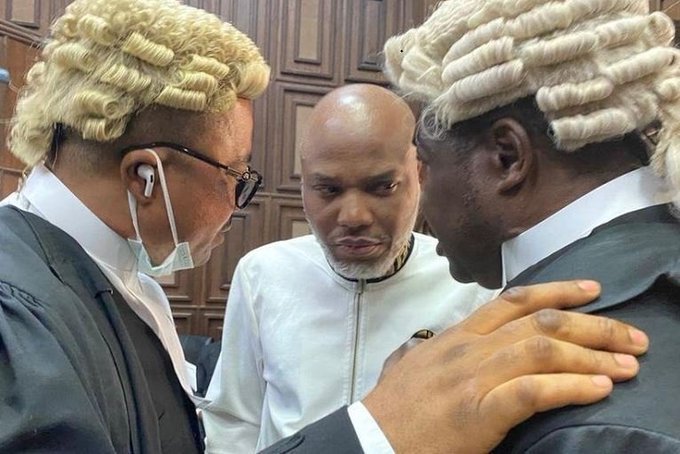Abuja, Nigeria — In a landmark ruling on Thursday, the Federal High Court in Abuja convicted Nnamdi Kanu, leader of the Indigenous People of Biafra (IPOB), on three of the seven terrorism-related charges brought against him by the Federal Government. The decision marks a significant development in one of Nigeria’s most high-profile legal proceedings and comes amid intense public scrutiny and national debate over separatist movements.
Court Delivers Verdict
Presiding Judge James Omotosho delivered the judgment after carefully reviewing prosecution evidence, which included video interviews in which Kanu allegedly issued violent threats against Nigeria and its citizens. The court found this evidence sufficient to uphold three of the seven terrorism charges, leading to Kanu’s conviction.
The presiding judge emphasized that the conviction was grounded in the weight of admissible evidence, highlighting the video recordings as a central component of the prosecution’s case. The court concluded that Kanu’s statements went beyond political expression and amounted to threats capable of inciting violence and undermining national security.
Background of the Case
Nnamdi Kanu, a prominent separatist figure, has long been at the center of Nigeria’s security and political discourse. He is widely known for advocating the secession of the southeastern region of Nigeria and for organizing rallies and broadcasts that have attracted both domestic and international attention.
The Federal Government charged Kanu under Nigeria’s anti-terrorism laws, citing his alleged involvement in activities intended to destabilize the nation. This case, which has spanned several years, has seen multiple hearings, adjournments, and controversies, reflecting the complex intersection of law, politics, and national security in Nigeria.
Prosecution Evidence
During the trial, the prosecution presented multiple forms of evidence against Kanu. Chief among them were video interviews in which he was purported to have made statements that threatened violence against the Nigerian state and its citizens. Legal experts have noted that the recordings were pivotal in establishing intent and the potential for real-world consequences arising from his actions.
The prosecution argued that Kanu’s speeches and broadcasts did not merely express political opinion but contained language designed to incite unrest, thereby meeting the legal threshold for terrorism charges under Nigerian law.
Reaction to the Conviction
The conviction has triggered mixed reactions across the country. Supporters of the Federal Government and national security advocates have welcomed the ruling, asserting that it reinforces the rule of law and sends a strong message against activities that threaten Nigeria’s sovereignty.
Conversely, Kanu’s supporters and civil rights advocates have expressed concern that the verdict may exacerbate regional tensions and infringe on freedom of speech and political expression. They argue that the case has been highly politicized and that the focus on video statements may set a precedent affecting activists and dissenters in Nigeria.
Legal Implications
The court’s ruling has significant implications for both Kanu and the broader political landscape. Conviction on terrorism charges can result in severe penalties, including long-term imprisonment, fines, and restrictions on political activity. Legal analysts suggest that the remaining four charges could result in additional convictions, depending on subsequent hearings and the presentation of evidence.
The case also highlights the Nigerian judiciary’s role in navigating high-stakes cases that involve questions of national security, human rights, and political expression. Observers note that the outcome could influence future cases involving separatist movements or individuals accused of inciting unrest.
Public and Political Impact
Nnamdi Kanu’s conviction comes at a time when Nigeria faces challenges related to national unity, security, and governance. Analysts suggest that the ruling may either stabilize the security situation by discouraging violent activism or deepen existing divides if perceived as politically motivated.
Political leaders and civil society organizations have called for calm and urged all parties to respect the legal process. Experts emphasize the importance of upholding the rule of law while also addressing the underlying grievances that fuel separatist sentiments.
Next Steps
Following the conviction, Kanu’s legal team is expected to consider options for appeal. Nigerian law allows for defendants to challenge convictions through appellate courts, which can review both procedural and substantive aspects of the trial. Any appeal could take months or even years to resolve, prolonging national attention on the case.
Meanwhile, security agencies are likely to continue monitoring IPOB and related activities to prevent any escalation of violence or unrest. The Federal Government has reiterated its commitment to maintaining peace, law, and order while ensuring that justice is served within the framework of Nigerian law.
Conclusion
The conviction of Nnamdi Kanu on three terrorism charges represents a pivotal moment in Nigeria’s ongoing struggle to balance national security with political freedoms. By grounding its judgment in evidence, including threatening statements captured on video, the Federal High Court has set a significant legal precedent.
As Nigeria awaits the handling of the remaining charges and any potential appeals, the case remains a focal point of national discussion about governance, security, and the rights of political activists. The nation watches closely as the judicial system navigates this complex and sensitive matter, which continues to shape the discourse on separatism, law, and order in Nigeria.














